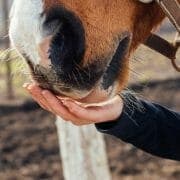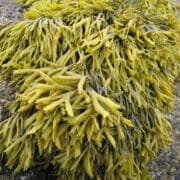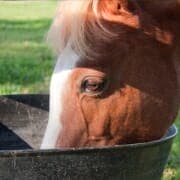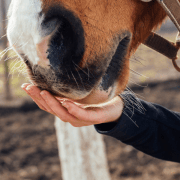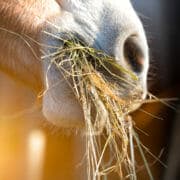Oil for Horses: Good or Bad?
Hard working horses have enormous requirements for energy that are traditionally filled using high grain rations fed together with chaff and hay. However, feeding large amounts of grain does come with its own set of issues which can include colic, hindgut acidosis, nervous or fiery behaviour, tying up and loss of appetite. Oil has gained popularity in recent years as a substitute source of energy for working horses, but is it effective? How much can be fed? Are all oils equal in the benefits they can provide? And do they cause any health issues of their own?
A little bit goes a long way
The biggest benefit oils provide working horses is their very high energy content relative to grains. Oils contain nearly 3 times more energy than oats, with 400 mls of vegetable oil providing as much energy as 1 kg of oats. The real benefit in this is you can reduce the size and sheer bulk of feed a horse has to consume without reducing calorie intake, allowing you to get enough ‘feed’ into horses with poor appetites. The end result being these horses can hold their weight and continue to train and compete for longer than they otherwise would on a more traditional diet.
Reducing heat load
Oils generate less heat during the digestive and metabolic processes than an equivalent amount of grain or forage. Feeding oil also means that you can feed less grain and still meet energy requirements. Combined, this means that high oil diets place less of a heat load on working horses, reducing electrolyte losses and the amount they need to sweat to stay cool, a big bonus for hard working horses, especially those training and racing in hot environments or working over very long distances.
Saving glycogen
Fatty acids from oils are the preferred fuel for muscles during slow and medium pace work while glycogen is the only source of energy a muscle can use during sprints and strenuous exercise. Once a horse runs out of glycogen its muscles fatigue and the horse will slow down and lose the ability to perform at the level it is capable of. Feeding oil in diets provides a source of fatty acids for muscles to burn during the warm up and slower phases of a competition, meaning muscles are able to conserve valuable glycogen and avoid fatigue.
Problem solving
‘Problem horses’ and particularly those that tie up or get excited and nervous on high grain diets will often benefit from rations that provide a portion of the dietary energy from oils. It is thought that the positive effects seen in these horses on high oil diets is due more to the reduction in grain intake as opposed to the addition of oil, but using oil in the diet allows you to reduce grain intake without compromising energy intake and performance.
Oils aint oils
All oils contain virtually the same amount of digestible energy, but there are other differences you may want to consider when looking to purchase an oil, including:
Essential Fatty Acid Content: Horses need omega 3 and omega 6 fatty acids in their diet. Grains are naturally high in Omega 6, so for horses on a high grain diet, it is preferable to choose an oil with some omega 3 content. The table below shows the amount of omega 3 and omega 6 in some commonly used oils. Linseed and canola oil contains the highest omega 3 fatty acid content of the natural vegetable oils.
| Ingredient Name | Omega 3 (%) | Omega 6 (%) |
|---|---|---|
| Linseed (Flax) Oil | 57 | 13.9 |
| Cod Liver Oil | 25 | 2 |
| Canola Oil | 10 | 20 |
| Soybean Oil | 7 | 52 |
| Corn Oil | 1 | 55 |
| Olive Oil | 1 | 11 |
| Rice Bran Oil | 1 | 39 |
| Sunflower Oil | 0.3 | 60 |
| Coconut Oil | 0.1 | 2 |
Palatability: Some linseed oils and fish oil including cod liver oil are notoriously unpalatable for horses, so while these oils are useful for providing omega 3 fatty acids, they can’t be fed in large amounts as most horses simply won’t eat them.
Processing Method: Oil is extracted from oilseeds in two main ways; cold pressing where oil is squeezed out of seeds, often in a water-cooled environment to keep the oil at less than 60C; and solvent extraction where a solvent like hexane is added to extract oil from seeds. The oil is then heated to remove the hexane. Cold pressed oils tend to be higher in quality as more of their essential fatty acids and natural antioxidants are left intact in comparison to solvent extracted oils.
It takes time
Horses need time to adapt to digesting and metabolising oils. Oils should always be introduced into a diet slowly, starting with ¼ cup of oil per day and increasing this by ¼ cup every 5 days until you reach the full amount you want to feed. Introducing oil into a diet too quickly can result in soft manure and reduced fibre fermentation in the hindgut.
It will take a minimum of 3 weeks before a horse starts to really benefit from the oil in its diet and it could take up to 3 months before the full benefits of oil are realised.
How much can you feed?
Horses can be fed up to 20% of their total energy intake as oil, which in real terms means just over 3 cups of oil per day for a 500 kg horse in full work. While this level of oil is useful for horses that tie up, very few horses are fed this much oil per day. Feeding between 1 and 2 cups of oil per day is enough to give horses the benefits discussed above without making diets messy, unpalatable or unnecessarily expensive.
Good Stuff
Oils are ‘good stuff’ for working horses. They reduce reliance on grains, make the amount of feed a horse needs to eat smaller, keep horses cooler, allow horses to conserve muscle fuel for sprinting, give horses that tie up a safer and more effective source of energy and provide essential fatty acids in the diet.
For the best results, introduce oils slowly into the diet and select oils based on the following: their omega fatty acid content with oils containing some omega 3 fatty acids preferred; palatability, be aware that some oils including linseed and fish oils can be unpalatable; and method of processing, with cold pressed oils preferred over solvent extracted oils.
Join FeedXL today and take control of your horse’s nutrition
Get EVEN MORE practical and personalised feeding guidance when you sign up to FEEDXL.
Do you have a question or comment? Do you need help with feeding?
We would love to welcome you to our FeedXL Horse Nutrition Facebook Group. Ask questions and have them answered by PhD and Masters qualified equine nutritionists and spend time with like-minded horse owners. It’s free!
Click here to join the FeedXL Horse Nutrition Facebook Group



